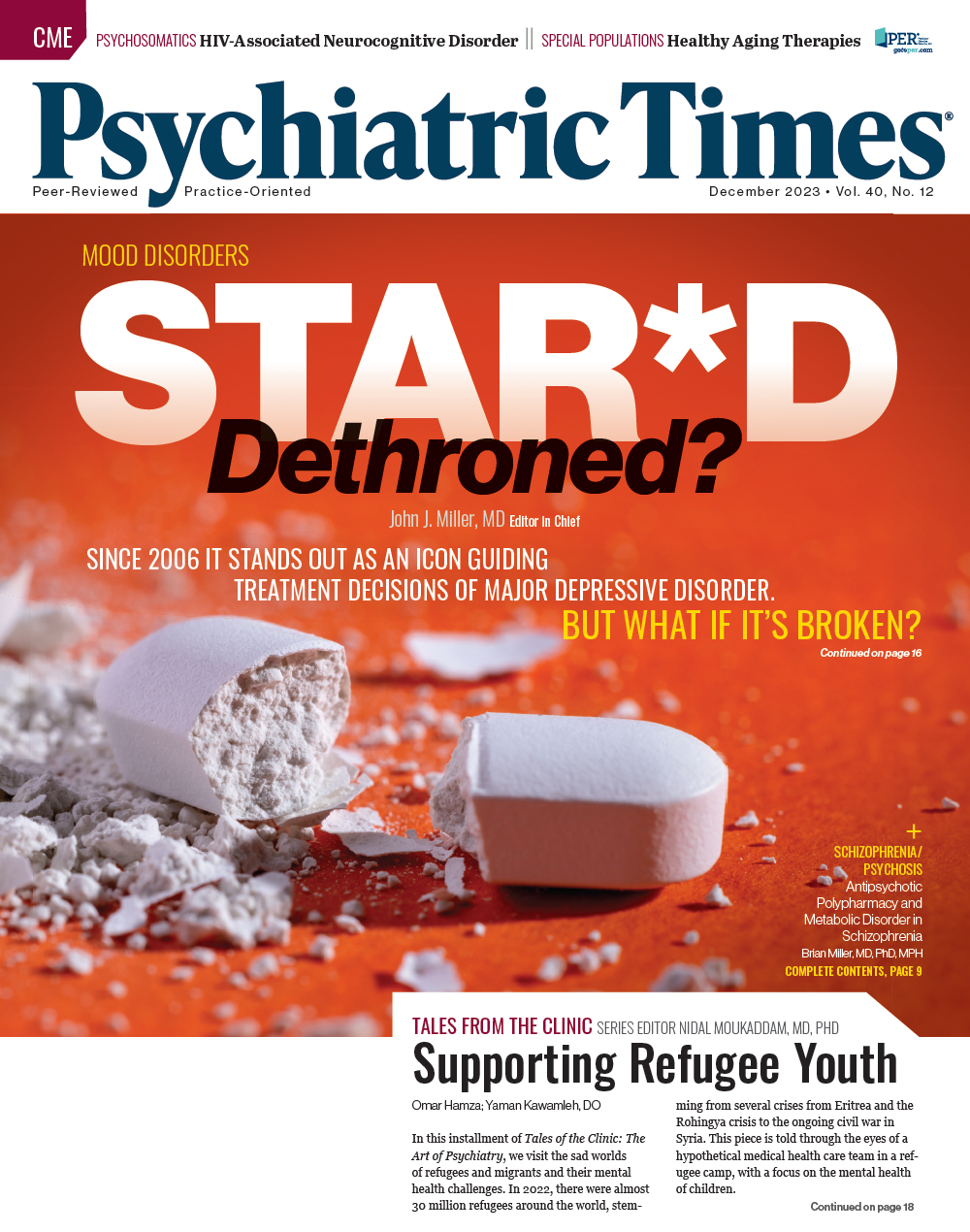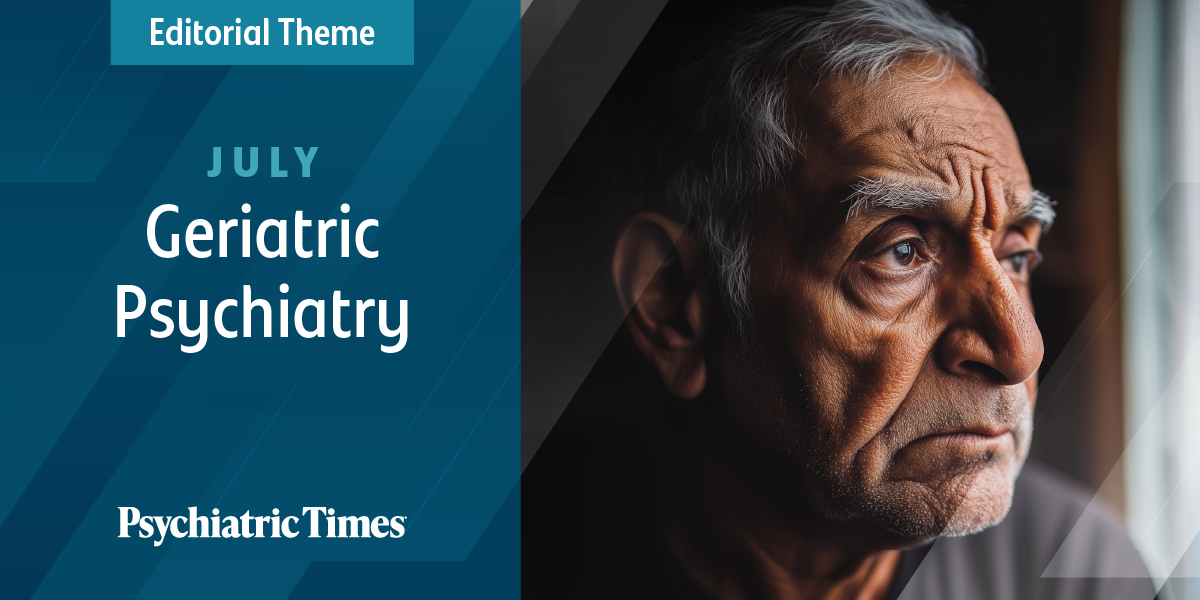Publication
Article
Psychiatric Times
Integrative Therapies for Brain Health and Aging
Author(s):
Clinicians must feel knowledgeable and masterful in incorporating lifestyle and integrative therapies targeting nutrition, stress reduction, normalization of sleep, aerobic and mindful exercise, and meaningful activities that add joy and life to years, and not just years to life.
zatevakhin/AdobeStock

SPECIAL REPORT: GERIATRIC PSYCHIATRY
With increasing life expectancies worldwide, 1 in 6 individuals in the world will be 60 years or older by 2030, and this population will reach more than 2 billion individuals by 2050. Between 2020 and 2050, the number of individuals 80 years or older is expected to triple and reach 426 million worldwide.1 This shift in the world’s population toward older ages has contributed to the rising prevalence of late-life mental, substance, and neurological disorders and rising costs to individuals and society.
In particular, the number of individuals with dementia is rising, and the global costs are estimated around $1 trillion annually.2 Limited pharmacological interventions exist to treat dementias and related behavioral symptoms, and they are riddled with harmful adverse effects and contribute to increased risk of polypharmacy and drug-drug interactions.3 Although the US Food and Drug Administration approved 2 new drugs for Alzheimer disease earlier this year, the use of these drugs remains extremely limited because of lack of availability, financial cost, and unclear benefits vs harms.4 More importantly, many of these interventions occur years after the onset of symptoms and with irreversible disease progression.
Complementary and integrative medicine (CIM) is becoming increasingly preferred in the United States, especially by aging baby boomers who spend billions of dollars to prolong their brain function and ensure healthy longevity, because these interventions are considered a gentler and safer option compared with conventional medicine.5 Many integrative therapies target whole-person health and incorporate the belief that wellness is a state of balance among the spiritual, physical, and mental/emotional domains of health.
It is well known that neurodegenerative and vascular changes in later life are driven by the cumulative effects of various modifiable risk factors such as diet, exercise, stress reduction, sleep quality, and vascular risk factors (eg, diabetes, hypertension, hyperlipidemia, and obstructive sleep apnea).
Integrative health practices also train individuals in lifelong skills for stress reduction, self-regulation, and health-promoting practices toward boosting overall health (eg, improvement of sleep quality, a diet that includes a rainbow of colored fruits and vegetables, the use of probiotics and prebiotics, stress reduction, and mental and physical exercise), which may allow for more sustained effects of these interventions, particularly with diseases of aging.
Brain Health and Dementia Prevention
The World Health Organization (WHO) recently released a position paper on brain health, defining it as “the state of brain functioning across cognitive, sensory, social-emotional, behavioral, and motor domains, allowing a person to realize their full potential over their life course, irrespective of the presence or absence of disorders.”6 Brain development is characterized by neuroplasticity, pruning, and senescence that occurs throughout the different stages of life.
Rapid growth of neuronal connections occurs in utero and in early childhood, while direct shedding of these connections occurs in later childhood and adolescence, and neuronal loss occurs in adulthood and older age. It is now known that brain health can be improved throughout the lifetime by minimizing risk factors as well as enhancing protective factors that promote neuroplasticity, particularly because many of the first pathological changes in the brain occur decades before dementia symptoms arise.6
The 2020 Lancet Commission on dementia, prevention, and care described 12 modifiable risk factors, which are listed in the Table 1.4 The lack of considerable progress in successful treatment or reversal of dementia may require a shift toward a primary prevention approach that starts decades before the onset of symptoms. Earlier primary intervention strategies may reduce the cumulative effects of psychological and physical trauma, lifestyle, and environmental exposures that precipitate these changes in the brain. Modification of these 12 risk factors may prevent or delay up to 40% of dementias.4
Using Integrative Therapies
The National Center for Complementary and Integrative Health defines “integrative medicine” as the use of both conventional and complementary practices in a coordinated way to target specific disorders or underlying neurobiological processes.7 Integrative medicine takes a whole-person and holistic approach to health because it considers multiple aspects of the individual, including the physical, emotional, interpersonal, behavioral, nutritional, environmental, and spiritual dimensions. This is particularly important given the complex pathophysiology of cognitive decline, the onset of pathological brain dysfunction that occurs decades before symptom onset, and the subsequent limited pharmacological interventions that exist.
Although billions of dollars are spent out of pocket each year in the United States on vitamins and supplements, these treatments remain largely unvalidated and not covered by insurance. For older adults, many of these supplements are perceived as more natural options, but they may cause unexpected adverse effects and drug-drug interactions.8 More accessible and cost-effective integrative interventions include a combination of lifestyle (nutrition, exercise, sleep) and mind-body therapies (MBTs) that can include, but are not limited to, yoga, tai chi, qigong, meditation, breathing practices, and mindfulness-based stress reduction and cognitive therapies (Table 2). Many MBTs incorporate the belief that wellness is a state of balance among the spiritual, physical, and mental/emotional selves. When combined with nutrition, exercise, and meditation/prayer, these imbalances may be corrected.
Many integrative practices also teach individuals lifelong skills for stress reduction, self-regulation, and health-promoting practices toward boosting overall health, which may allow for more sustained effects of these interventions, unlike pharmacological or supplemental approaches.9
Given the complex proposed pathological mechanisms of aging and neuroplasticity across the life span, yoga and tai chi have been examined in several randomized controlled trials and have consistently shown positive impact on improving cognitive decline.10 Both yoga and tai chi incorporate learning and integrative breath-movement sequences, relaxation, and focus of attention during meditation, which may improve and strengthen the physical changes that occur with aging as well as improving the neural plasticity that can continue across the life span. The physical postures of yoga and tai chi may increase balance and strength, thereby reducing risk of falls and increasing strength of muscle mass that declines with age and lead to improvement in muscular-skeletal chronic pain.10
Aside from learning the physical postures, the cognitive benefits of yoga and tai chi include adopting a mindfulness philosophy that improves emotion regulation and resilience, cognitive flexibility, and memory, thus improving brain health on cellular, structural, functional, and emotional levels.10-12 With the COVID-19 pandemic and shift toward telehealth, there have been attempts to adapt yoga and tai chi protocols to virtual-based platforms for older adults to increase accessibility and lower costs. The initial studies using virtual-based protocols show very promising results indicating both acceptability and potential positive therapeutic impact on cognition.10
In addition to MBTs, lifestyle modifications that include nutrition, sleep, pain management, exercise, and spirituality or meaningful, purposeful, joyous activities have become equally important in brain health and aging. Although it is well established that dietary patterns, such as the Mediterranean diet, and exercise confer many health benefits and are incorporated in many primary prevention strategies for depression, cognition, and cardiovascular disease, spirituality is often an overlooked factor.9,10,13
For older adults, spirituality is an extremely important presence and influence on daily life compared with other age groups. Furthermore, it serves as a key factor in resilience.13 Spirituality, wisdom, and resilience are highly correlated, and many studies have shown that older adults use spirituality as a tool to promote and maintain resilience through 5 key domains: reliance on relationships, spiritual transformation, spiritual coping, power of belief, and overall wisdom and commitment to spiritual values and practices.13,14 This suggests the value of focusing on spirituality in older adults who face chronic mental and physical illnesses.
Clinicians can therefore inquire about, encourage, and try to bolster spiritual well-being and cultivate wisdom in older adults as part of their routine visits and screening as part of a more integrative approach to health.
Future Directions
To optimize brain health and prevent the onset of neuropsychiatric disorders associated with aging, we need a more comprehensive and transdisciplinary approach that links brain function to the fields of psychiatry, neurology, and primary care to promote public awareness and early intervention strategies that would minimize all known dementia risk factors.
Given the perfect storm of rapidly increasing need for expert clinicians and worsening shortage of geriatric specialists, all health care providers should be trained to incorporate brain health–centered interventions including stress reduction techniques; cognitive and positive emotion therapies; psychological, physical, and cognitive resilience building; reduction in loneliness and increase in social connectedness; and engagement in meaningful activities that promote a sense of purpose.15
Clinicians must feel knowledgeable and masterful in incorporating lifestyle and integrative therapies targeting nutrition, stress reduction, normalization of sleep, aerobic and mindful exercise, and meaningful activities that add joy and life to years, and not just years to life.
Dr Nguyen is an assistant clinical professor in the Department of Psychiatry and Biobehavioral Sciences, David Geffen School of Medicine, at the University of California, Los Angeles (UCLA). She is also associate program director of the UCLA Psychiatry Residency Training Program and associate director of the UCLA Integrative Psychiatry Clinic.
Dr Lavretsky is a professor in residence in the Department of Psychiatry at UCLA in Los Angeles, California. Her work on geriatric depression and integrative mental health using mind-body interventions has received national attention, and she has won numerous grants supporting that work. She is president-elect of the American Association for Geriatric Psychiatry, a distinguished fellow of the American Psychiatric Association and of the American Association for Geriatric Psychiatry, and a fellow of the American College of Neuropsychopharmacology. She is also on the board of Psychiatric Times.
References
1. Ageing and health. World Health Organization. October 1, 2022. Accessed October 21, 2023. https://www.who.int/news-room/fact-sheets/detail/ageing-and-health
2. Maher RL, Hanlon J, Hajjar ER. Clinical consequences of polypharmacy in the elderly. Expert Opin Drug Saf. 2014;13(1):57-65.
3. AARP and National Center for Complementary and Alternative Medicine. Complementary and Alternative Medicine: What People Aged 50 and Older Discuss With Their Health Care Providers. AARP Research; 2011.
4. Livingston G, Huntley J, Sommerlad A, et al. Dementia prevention, intervention, and care: 2020 report of the Lancet Commission. Lancet. 2020;396(10248):413-446.
5. Tampi RR, Forester BP, Agronin M. Aducanumab: evidence from clinical trial data and controversies. Drugs Context. 2021;10:2021-7-3.
6. Optimizing brain health across the life course: WHO position paper. World Health Organization. August 9, 2022. Accessed October 21, 2023. https://www.who.int/publications/i/item/9789240054561
7. Complementary, alternative, or integrative health: what’s in a name? National Center for Complementary and Integrative Health. Updated April 2021. Accessed October 31, 2023. https://www.nccih.nih.gov/health/complementary-alternative-or-integrative-health-whats-in-a-name
8. Ronis MJJ, Pedersen KB, Watt J. Adverse effects of nutraceuticals and dietary supplements. Annu Rev Pharmacol Toxicol. 2018;58:583-601.
9. Nguyen SA, Lavretsky H. Emerging complementary and integrative therapies for geriatric mental health. Curr Treat Options Psychiatr. 2020;7(4):447-470.
10. Nguyen SA, Oughli HA, Lavretsky H. Complementary and integrative medicine for neurocognitive disorders and caregiver health. Curr Psychiatry Rep. 2022;24(9):469-480.
11. Brenes GA, Sohl S, Wells RE, et al. The effects of yoga on patients with mild cognitive impairment and dementia: a scoping review. Am J Geriatr Psychiatry. 2019;27(2):188-197.
12. Laird KT, Paholpak P, Roman M, et al. Mind-body therapies for late-life mental and cognitive health. Curr Psychiatry Rep. 2018;20(1):2.
13. Manning L, Ferris M, Rosario CN, et al. Spiritual resilience: understanding the protection and promotion of well-being in later life. J Relig Spiritual Aging. 2019;31(2):168-186.
14. Jeste DV, Thomas ML, Liu J, et al. Is spirituality a component of wisdom? study of 1,786 adults using the expanded San Diego Wisdom Scale (Jeste-Thomas Wisdom Index). J Psychiatr Res. 2021;132:174-181.
15. Eyre HA, Stirland LE, Jeste DV, et al. Life-course brain health as a determinant of late-life mental health: American Association for Geriatric Psychiatry expert panel recommendations. Am J Geriatr Psychiatry. 2023;31(12):1017-1031.

Newsletter
Receive trusted psychiatric news, expert analysis, and clinical insights — subscribe today to support your practice and your patients.




